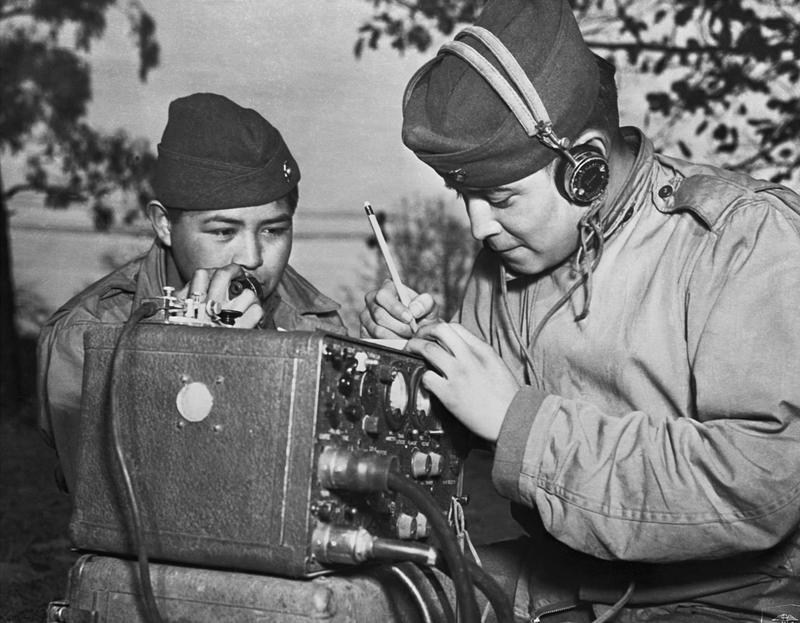Navajo Code Talkers Ensured a WWII Victory
By | December 11, 2018

The element of surprise is mo more important than it is during wartime. Keeping information secret from the enemy could mean the difference between life and death, victory and defeat. During the first part of World War II, the Allies troops were struggling with the security of their communications. The Japanese were quickly able to break the U.S.’s code and decipher their messages. Clearly, the U.S. forces needed an unbreakable code if they were to gain the element of surprise and turn the tide of war in their favor. They found their perfect new code in an ancient Native American language, thanks to the Navajo code talkers.

Recycling an Old Idea
When the United States military decided to use the Navajo language for codes, they were recycling an old idea. During World War I, the U.S. troops the Choctaw language for coding messages, but they were bested by the Germans and Japanese. Many Japanese military officials had been educated in the United States and had learned some of the popular Native American languages. Navajo, however, was a whole different animal.

Navajo Is a Unique and Challenging Language
A World War I veteran and civil engineer, Philip Johnston, had an idea to help the war effort. As the son of missionaries, Johnston grew up along the border of Arizona and New Mexico on the Navajo Reservation where he learned to speak Navajo fluently. He knew from experience that Navajo is a difficult and complex language, particularly challenging for non-native speakers. First, there is no native written language to correspond to the spoken language. Second, the language relies heavily on inflections for deriving meaning. The wrong inflection on a word and a totally different meaning can be construed. The verb tenses are unfamiliar to non-native speakers and are rather complicated. Lastly, Johnston knew, there were not many speakers of the Navajo language left.

Johnston Proposed Using Navajo as a Military Code
Johnston presented his idea of using the native Navajo language as a military code during World War II to Lieutenant Colonel James E. Jones, Signal Corp Communications Officer at Camp Elliot in San Diego. Jones, at first, dismissed the idea. After all, the U.S. military had used Native American languages before and the Japanese were able to decipher them. Johnston was adamant. The syntax and the linguistics of the Navajo language are unique and tricky…nearly impossible to translate on one’s own.

Johnston Set Up a Demonstration
To prove his point, Johnston offered to set up a demonstration for Jones and other top officials. He invited four Navajos who were fluent in both the Navajo language and English to help him out. He put two of the Native Americans in one room and two in another. One pair was given a message in English. They were asked to translate it into Navajo and send it via shortwave radio to the other team in the other room. They received the message in Navajo and successfully translated it into English. The military officials could immediately see the applications.

Recruitment Began on the Navajo Reservation
The Marines began a recruitment campaign on the Navajo Reservation and got a group of skilled, physically fit young Navajos that could work as communications experts in combat. They were put through training in San Diego and took classes in communications. They worked with Navajo language instructors because there was a need to add some new, military-related words to the Navajo vocabulary…all of the code talkers needed to be on the same page.

The Code Talkers Joined the Marines
All six division of the Marines in the Pacific campaign were assigned Navajo code talkers and the Native Americans immediately began to turn the war. Their language confused enemy listeners.

Navajo Code Talkers Made the Victory at Iwo Jima Possible
According to the commanders, it was the Navajo code talkers who controlled the entire operation when the Marines came ashore to take Iwo Jima. Six code talkers worked day and night, sending and receiving more than 800 messages to ensure that the offensive ran without a hitch.

The Navajo Code Talkers Received Praise for Their Work
The story of the Navajos work during World War II was not widely known at first, partially because the code talker program was classified until 1968. In 2001, President George W. Bush presented Congressional Gold Medals to the 29 original Navajo code talkers.

The Code Talkers were the Subject of a Nicolas Cage Movie
The 2002 military action movie, Windtalkers, starred Nicolas Cage and Adam Beach as Marines were tasked with protecting a small group of Navajo code talkers so they can transmit their messages. This movie helped to bring the code talkers’ story to a wider audience and highlighted the need to preserve Native American languages.

